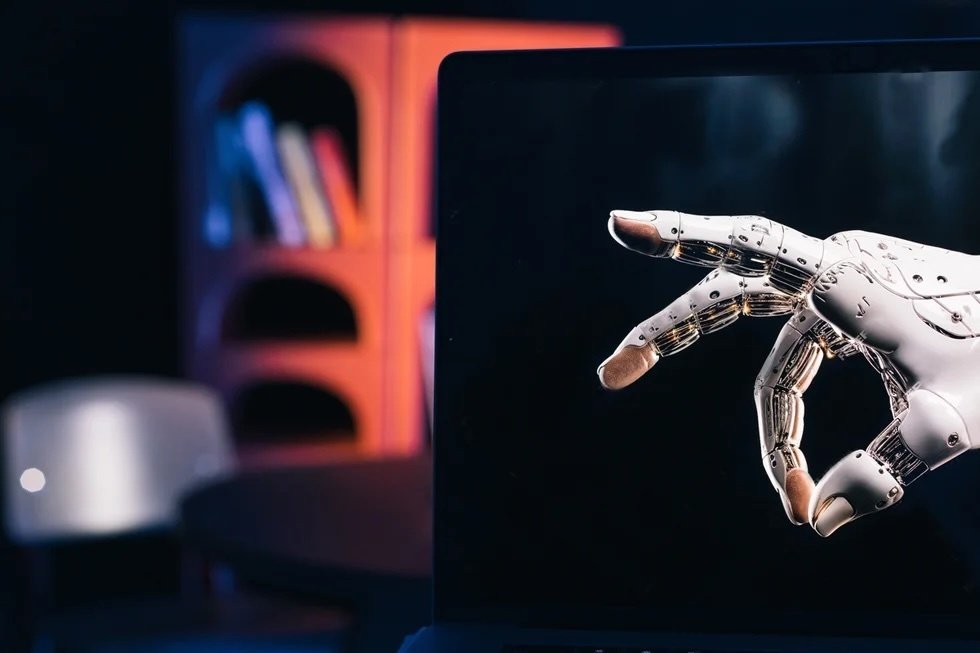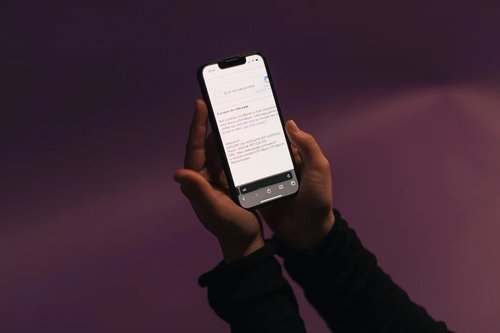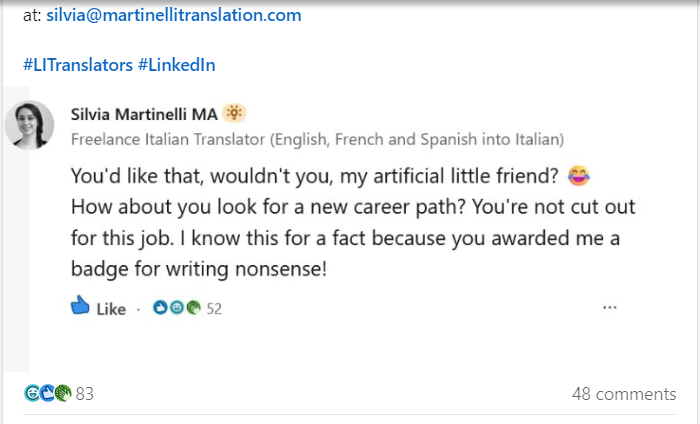10 fun ways people are using AI at work
Nov 05, 2024
6 mins


Freelance writer and translator, ex-recruiter
Love it or hate it, AI is sneaking its way into our lives under the cover of darkness, invading our offices, and exploding into our homes, supposedly saving us from mundane repetitive tasks and making our lives easier. In the US almost half of 18-29 year olds have used ChatGPT (the largest user group) with 30-49 year olds lagging at 27%. While you and I and Uncle Bob are stuck using Grammarly’s editing function, asking Alexa what to make for dinner, and having Gmail predict our email replies, those in the know have taken AI’s capabilities and are using it in increasingly imaginative and interesting ways.
Web3 & AI expert and founder of Sintra Synergies Joeri Billast claims “There is no limit to what you can imagine” with AI. Founder of Moxie AI Stephanie LaFlora agrees, “The stuff you can do is crazy and none of what I said requires coding, it’s amazing!” Want to up your AI game, amuse and wow your colleagues, or simply have a good laugh? Here are 10 fun and creative ways people are using AI at work.
1. Making talking heads of themselves
Who hasn’t wondered how great it would be to make video content without having to stress over whether you look on brand, if you’ve got eyebags from a restless night, or worry that you haven’t managed to cover up the huge zit that appeared when you woke up? Well, now you can with Veed, Tokkingheads, Captions, and the like. You create a clone of yourself in a video, right down to your voice. It looks like you, it sounds like you, and according to LaFlora—a self-confessed nerd when it comes to this sort of thing—it could save you a bunch of time. “I love efficiency so much so I just really nerd out on the ways I can speed up all the things we do today using combinations of AI and automation … I’m thinking about that in a bunch of different ways. One [is] social media content, because who has time to always film everything? Also, I’m thinking about it in the sense of sales because I can send personalized videos to people. I would even consider rigging up some type of crazy automation with the combination of Zapier and this software.” In her mind’s eye, she can picture a spreadsheet with names and company details, a dynamically created script that generates automatically, and the video output of her talking directly to whoever can then be sent in an email or a DM on social media. It sounds wild but it is possible.
2. Creating conversations they don’t understand
Trainer and podcaster Steve O’Neil may not always be AI’s biggest fan, but he’s not against a bit of fun at work. In a recent episode of his podcast series, he used it to create a soundscape of a conversation in Swahili—a language he does not speak or understand. A task that would have been pretty tricky before AI is now a breeze! In this case, it was about creating a certain atmosphere with a dash of authenticity, so he didn’t have to worry too much about the accuracy of the conversational content. Need a little interesting soundtrack while you work? Why not give it a go?
3. Setting up a battle between the greatest marketing minds of the times
Billast uses AI every day in his work, but one of his more fun approaches was asking ChatGPT to take part in a battle with well-known marketing minds to create a top-converting landing page. He says, “A lot of people say, ‘Imagine you’re a top funnel marketing person [when working with ChatGPT]’ so I put them in competition—it makes it a bit fun. By challenging the AI and not just taking the first answer, and by giving it some context, it comes up with more original ideas.”
Here’s how it worked: The battle was between Russel Brunson, GaryVee, and Ryan Deiss with ChatGPT as the fourth competitor, and the input was something like this: ‘Imagine you are a top funnel marketing strategist and you are in a battle with those people. You need to win by defining the best possible, out-of-the-box, converting landing page for my event.’ The URL of the landing page is added and then Billast prompts, ‘Give it your best shot.’ After round one he tells ChatGPT it’s in third place, and offers more motivation, encouraging more out-of-the-box thinking. After round two the AI is in second place, and after a final round, he tells it that it has won. The output will still need tweaking but it’s a more fun approach to getting what you’re looking for.
4. Saving their sanity with a little custom therapy
LaFlora has a genius idea to help her keep on track and on top of her mental health: “I have built a custom GPT which I have named The Calm Companion. It’s for myself, it’s like my AI therapist. I’ve programmed it based on things that I believe and I know to be true. An example would be [that] I believe that life is a grand adventure, I don’t believe there are trophies really in the end, I believe that everybody’s ending is the same whether they did everything right or wrong.” The way this helps her at work is that when she’s worrying or freaking out over something, it will remind her that life is an adventure and not everything has to be done perfectly. She calls it her sane maker and says the fact that it’s based on her core beliefs is why it works. Give it a go to save your time, money, and sanity!
5. Saving their skin with a personal IT Help Desk
You don’t have to be tech-minded to use AI. In fact, surely that’s a huge part of its selling point, right? For non-tech wizards, it can help you out of a bind. Lisa Barrett uses Co-pilot whenever tech panic strikes for questions like, ‘I just deleted my Word toolbar, how do I get it back?’ It might just save you hours of scrolling to find the solution that works for you.
6. Gamifying your co-working experience
Another gem from LaFlora comes from a client of hers, Indie, who has recently launched a coworking membership site that gamifies collaboration. The site is aimed at builders, creatives, freelancers and entrepreneurs. Gamification using AI can be applied to all sorts of office antics, from rewarding great ideas in the boardroom to who makes the first coffee run of the day and who clears the email inbox fastest on a Monday morning. It’s amazing what people will do for a digital badge of honor, and you can always throw in some donuts for extra motivation if it’s a task that no one really wants to get done!
7. Figuring out how to make an idea appeal to people
Who’d have thought we’d one day be looking to machines to tell us how to appeal to the people around us? You could do something productive and dull like figure out your target customer, or use it to help you decide what gift to buy your co-worker for their birthday. You could try adapting a chatbot with personality to read between the lines of your next meeting, or figure out what’s making everyone in your workplace tick this week by tracking popular hot topics, or try a mood-swing poll with tech similar to TinyPulse.
8. Checking in with the Black Godfather of Silicon Valley
This one may not quite be ready for release just yet but LaFlora is working on a program called Roy after Roy Clay, the little-known Black Godfather of Silicon Valley. The concept is that he’s a cultural competency expert, so you can check in and see how your content will land. The idea is a fun one—you can tap into the knowledge of a historical figure. It could also be extremely helpful for companies that want to create content that resonates with people of all different backgrounds. Roy will be a cultural expert who has conducted research, read deep cultural studies, and studied authors who are experts in this space.
9. Amusing others with useless answers
Not technically using AI but certainly messing with the AI and algorithms, Translator Silvia Martinelli has her network raising a smile with her random replies to questions for collaborative articles on LinkedIn. For example:
10. Finding out just how scary that spider lurking in the corner is
Arachnoids have a way of instilling a special kind of fear, but at least you can now find out quickly if it’s poisonous, why it looks so weird, and if it’s about to have hundreds of babies and take over your desk space—all with the help of an AI app like Spider Finder. Whether you’re a fan or living in fear this app will save the day!
Key takeaways: Embracing AI for work and play
As you can see, there’s more to AI than just boosting productivity. From gamifying your coworking space to turning your worries into calming pep talks with a personalized AI therapist, AI is transforming the workday with a splash of creativity and fun. Here are some key takeaways for embracing AI at work:
- AI Goes beyond productivity: From custom therapy chatbots to gamified coworking spaces, AI tools are infusing a mix of fun, creativity, and utility into the workplace, reshaping how we handle everyday tasks.
- Personalized and creative uses: AI allows for highly personalized experiences, whether it’s a virtual “calm companion” for mental wellness, cultural check-ins inspired by historical figures, or talking head avatars for seamless video content.
- Accessible innovation: Creative uses of AI are available to everyone, helping with everything from tech fixes to playful twists on meetings or generating multilingual content. The only limits are our imagination.
- Fostering team connections: AI can spark new ways to connect, from virtual competitions to enhanced social engagement, adding a fresh layer of interaction in both remote and in-office settings.
So, whether you’re battling virtual marketing legends or figuring out just how terrifying that office spider really is, take a moment to explore AI’s capabilities and brighten your day with a little innovation. Embracing AI can turn routine tasks into a source of genuine workplace enjoyment, and who doesn’t need a little more of that?
Photo: Welcome to the Jungle
Follow Welcome to the Jungle on Facebook, LinkedIn, and Instagram and subscribe to our newsletter to get our latest articles every week!

More inspiration: Productivity & tools

Goal setting: How to bounce back when you feel like a failure
The big F word ... Failure. We all face it, but here’s how to make it your secret weapon for success.
Dec 18, 2024

Productivity boost: Why mental health outshines long hours
Long hours don’t equal better work. Discover how mental health support can unlock productivity and time efficiency in the workplace.
Nov 28, 2024

12 Slack habits that drive us crazy
Slack is a top messaging platform, but coworkers can misuse it. Over-tagging and endless messages can make it frustrating ...
Oct 16, 2024

10 CareerTok creators you should be following
Looking for career advice? CareerTok has quick tips from real experts on interviews and job offers.
Sep 25, 2024

Finding your Genius Zone … and staying there
Have you found your "genius zone" yet? If not, how can you get there?
Jul 10, 2024
The newsletter that does the job
Want to keep up with the latest articles? Twice a week you can receive stories, jobs, and tips in your inbox.

Looking for your next job?
Over 200,000 people have found a job with Welcome to the Jungle.
Explore jobs
